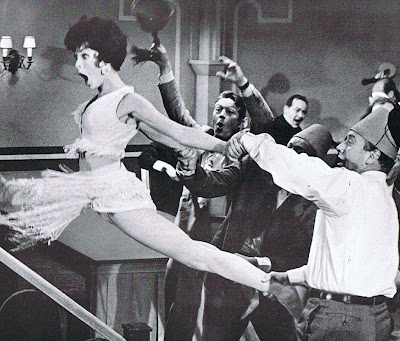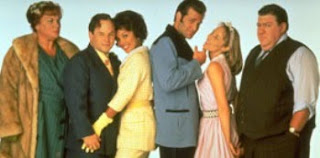
The cast of the good film of "Bye Bye Birdie," the one directed by Gene Saks, not George SidneyAfter nearly 50 years, "Bye Bye Birdie" has made it back to Broadway for, unbelievably, its very first New York City revival.
The beloved Charles Strouse-Lee Adams musical comedy from 1960 (their debut) had been Gower Champion's Broadway directorial debut, with Champion both helming and choreographing, and his appealing cast included Dick Van Dyke as Albert, a reluctant talent agent; Chita Rivera as Rosie, his secretary and muse; the late, inimitable Kay Medford as Albert's grasping mother, Mae; Dick Gautier, dynamite as the Presley-like Conrad Birdie; Susan Watson, the first and best Kim MacAfee, a girl possibly being corrupted by Birdie; Michael J. Pollard (yes!) as Hugo Peabody, her lovelorn boyfriend, and the late Paul Lynde who, as her father, turned the all-American dad into a sissy. A nice subversive touch, especially when set in the idyllic Sweet Apple, Ohio - Small Town, U.S.A.
The New York Times greeted with the new revival with a pre-opening puff piece by Charles McGrath and Ben Brantley's savage pan, both of which invoked unfavorable comments about George Sidney's 1963 film version.
No complaints from me here. Sidney's film was pretty much a bastardization of the show - albeit an inexplicably popular bastardization.
No mention, however, of the fine 1995 television film made from the material by Gene Saks - a version that went back to Michael Stewart's original book for the show (the TV film has no screenplay credit) and that restored the more sophisticated Strouse-Adams songs that Sidney and his hack writer Irving Brecher promptly trashed in order to showcase Ann-Margret, grotesquely miscast as a teen ingenué. Columbia let Sidney and Brecher make so many bizarre and gratuitous changes that you have to wonder why the studio bought the film rights to the show in the first place.
Not that it mattered at the time - or even now - but Sidney's film also starred Van Dyke and Lynde, recreating their Broadway roles (Lynde in a less exaggerated, more conventional version of what he played on stage), a wasted Janet Leigh as Rosie, a game Maureen Stapleton as Mae, Bobby Rydell, a bad actor utterly hopeless as Hugo Peabody, and a humorless stick named Jesse Pearson, a complete wash-out as Birdie.

Jason as AlbertChampion, who was initially set to make his film-directing debut with "Birdie," reportedly took one look at the script and bailed. Among the excised songs were the excellent "An English Teacher," which opened the show, the cynical "All-American Boy," the Sinatra-esque "Baby, Talk to Me," the defiant duet "What Did I Ever See in Him?" and, most jaw-dropping of all, the show-stopping "Spanish Rose." After Champion left, Onna White was brought in to choreograph. (He eventually made his film directorial debut the same year - 1963 - with Debbie Reynolds' "My Six Loves"; Reynolds was Champion's original choice for the screen Rosie; he had Jack Lemmon, his co-star from H.C. Potter's 1955 musical, "Three for the Show," in mind for Albert.)

Janet Leigh, being a good sport and a team player in the misconceived first "Birdie"The 1963 film Disney-fied the material, stressing the kids (mostly A-M). The adult characters were either downplayed or turned into morons. Albert, ostensibly the lead character, was planning to be an English teacher in the stage version (hence, the opening song); for Sidney's film, his college major was changed to chemistry - an alteration that added all sorts of nonsense involving a pill called Speedo, a turtle and a Russian ballet company. The "Put on a Happy Face" number, staged on Broadway as an appealing Gene Kelly-type bit, incorporated stick-figure animation for the film. The whole affair is crude and idiotic - and unnecessary.

Chita & Dick in the originalAnd, apparently, the new Broadway revival is just as bad (that's if you go by Ben Brantley, of course). So much for "Bye Bye Birdie's" reputation as "foolproof."
Before Saks filmed his version, he directed a 1991 revival with Tommy Tune and Ann Reinking that opened in San Francisco and then toured. It was full of newcomers - up-and-comging Susan Egan in the A-M role of Kim MacAfee; Marc Kudisch as Conrad Birdie and Steve Zahn (yes!) as Hugo Peabody, the goof who fancies Kim his inmorata.
Alan Sues, from "Rowan and Martin's Laugh-In," was once on-board to play the Lynde part of Harry MacAfee - and presumably revive the sissiness of the role - but he never became a part of the ensemble. The role was played by Dale O'Brien, who essayed it as a sitcom dad.
Saks' was the complete show. He added a new song for Tune called "A Giant Step" - and he resisted inserting the title song that was especially written for (forced upon?) the Sidney film. There was one deletion, however: Saks dropped the Act One "How to Kill a Man" dance, a comic dream ballet that I suspect was designed by Champion specifically to showcase Rivera. In it, Rosie dances her way through fantasy murders and the piece ends with Van Dyke's Albert, expiring and ascending into the sky - the rafters - wearing wings and being pulled up by wire.
(Note in Passing: "How to Kill a Man" has never been staged in any other production of "Bye Bye Birdie" that I've seen, only the original - although, frankly, I have no idea if it is included in the new revival.)
When this "Birdie" went on tour, Strouse and Adams added another new song - "He's Mine," a witty battle of wills sung by Rosie and Mae.
Saks ("Barefoot in the Park" and "The Odd Couple") clearly learned a lot in the four years between staging his revival and directing the movie. His '95 TV film is the definitive "Bye Bye Birdie," with more music than I've seen in any other version of the show. "A Giant Step" from the 1991 revival was inserted into the plotline, but not "He's Mine." Instead, Strouse and Adams wrote two new songs, "Let's Settle Down" (for Rosie) and "A Mother Doesn't Matter Anymore" (for Mae). Saks also gave in and used the song "Bye Bye Birdie" twice - over the main credits and also as a pleasing four-part harmony, rendered by a quartet of teenage girls.

Kudisch reprised his role as Birdie for the TV version, joined by versatile Jason Alexander as Albert, a very fine Vanessa Williams as Rosie, Tyne Daly, frighteningly good as Mae, Chynna Phillips, a modest Kim, and George Wendt as Harry. The '95 film also revived the role of Gloria Rasputin, played by Vickie Lewis (who appeared with Alexander on a few "Seinfeld" episodes as his secretary.)
Saks filmed the material in the style of Robert Zemeckis' charming "I Wanna Hold Your Hand" (1978), with production designer Charles C. Bennett and set decorator Cynthia T. Lewis, abetted by cinematographer Glen MacPherson, giving the opening New York scene a gray, near-sepia-toned look and the scenes set in Sweet Apple a pastel glow. Mary E. McLeod's costume design fully complement this coloring. And Ann Reinking, Saks' Rosie on stage, did the first-rate choreography.
All in all, this "Bye Bye Birdie" is one of the all-time best screen musicals...
...even if it was made for the small screen.
And, good news! It's available on DVD.
No comments:
Post a Comment